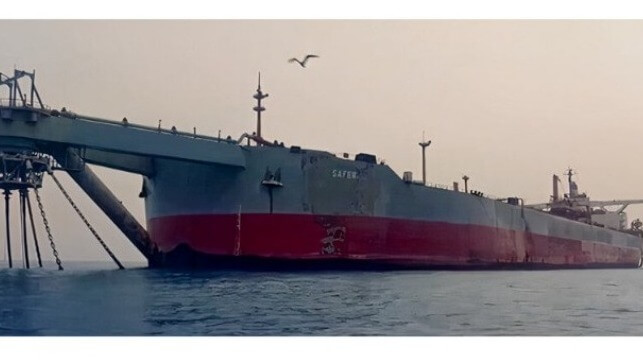SMIT Signs UN Contract and Prepares to Start FSO Safer Oil Transfer

Boskalis through its SMIT Salvage subsidiary is preparing to start the next phase of the operation to defuel the decaying FSO Safer off Yemen. The United Nations Development Programme and Boskalis executed the contract today in Rotterdam that is expected to take about two months to complete.
The offshore support vessel Ndeavor (7,400 dwt) is being prepared and is expected to depart Rotterdam in the coming hours to begin the next phase of the operation. Boskalis reports the vessel is being loaded with the necessary generators, hydraulic pumps, and other specialized equipment that will be required during the operation. SMIT Salvage has been involved since 2021 assisting the United Nations in developing the plan for the removal of the estimated 1.14 million barrels of light crude stored aboard the Safer. Boskalis says the vessel is well suited to the task because it has a large among of deck space and can accommodate up to 98 people for the extended stay on-site.
“The agreement today between UNDP and Boskalis subsidiary SMIT Salvage, to deploy a team of leading experts aboard the Ndeavour marks another critical milestone of the ‘Stop Red Sea Spill’ operation to transfer oil from the decaying FSO Safer to a safe temporary vessel,” said Achim Steiner, UNDP Administrator. “We look forward to working with Boskalis and other leading experts to prevent a humanitarian, environmental, and economic disaster."
Boskalis made available a copy of the plan overview which shows the Ndeavor will require approximately 20 days sailing from Rotterdam through the Suez Canal to reach Djibouti where final preparations will be made. The vessel’s AIS data is projecting that it will reach the Suez on May 7. While in Djibouti 40 salvage experts will join the vessel along with its crew of 25.
Once it reaches the Safer, which is located approximately 4.8 nautical miles off the coast of Yemen, the plan calls for a multi-stage inspection to begin. The FSO has only had a small caretaker crew since 2015 when operations were suspended due to the civil war in Yemen. The UN has reported that preliminary assessments showed the vessel is rapidly decaying and at this time is past the point of repair. The SMIT survey will include a visual inspection, measuring the levels of toxic gases, an inspection of the pump and engine room, the mooring arrangements, condition of the cargo as well as the cargo and inert gas lines, valves, and manifolds.
The inert gas system and venting of the tanks have been non-operational for years so the expectation is that gases have built up to dangerous levels. SMIT is bringing a portable inert gas generator and expects it will take up to 16 days to stabilize the tanks.
Only once this is completed will the VLCC tanker Nautica (307,000 dwt) that the UN acquired from Euronav be permitted to come alongside. The Nautica a 15-year old VLCC departed Singapore earlier in April and is currently anchored off Malaysia. The UN has said it would reach Yemen by mid-May.
SMIT expects that it will take 19 days to complete the ship-to-ship transfer. After that, the team will undertake to clean residual oil from the Safer’s tanks using a mobile spray tank cleaning machine. This is expected to require an additional 17 days. Then arrangements will be made for the Safer to be removed for recycling.

that matters most
Get the latest maritime news delivered to your inbox daily.
“This operation highlights the unique role the UN can play to address the world’s seemingly intractable problems. UNDP and other partners inside and outside the UN should be proud of their roles in getting us this far,” said David Gressly, the UN Resident and Humanitarian Coordinator for Yemen, who has led UN system-wide efforts on the Safer since 2021.
The UN however remains approximately $29 million short of its fundraising goal for the project. The United Kingdom and the Netherlands announced that they will co-host a pledging event on May 4 with the aim of fully funding both phases of the Safer project. At the beginning of April, UNDP reported that the project had received firm commitments for $95 million. The total budget for this first phase is $129 million, which they said left a gap of $34 million.
